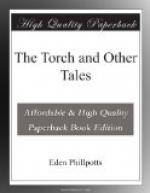But nobody’s cleverer to hide his nature than a lover, and Warner found himself burrowing into Nelly’s life a bit and sizing up her character, though full of caution not to commit himself; and she was very near as clever as him, and got to weigh up his points, good and bad, and to feel along with such a man that life might be pleasant enough for a nature like hers. For she was a good manager with a saving disposition. She liked John’s handsome appearance and reckoned the fifteen year between ’em would work to suit her. And, more than that, she hated her business, because a shop-of-all-sorts have got a smell to it like nothing else on earth, and Nelly found it cast her spirits down a bit as it always had done. She made no secret of this, and John Warner presently got to see she was friendly disposed towards him and might easily be had for the asking if he asked right. He took his time, however, and sounded Jane, where he well knew the pinch would come.
He gleaned her opinion casual on the subject of a woman here and there, and he found Jane thought well enough of Mrs. Bascombe, whose shop was useful and her prices well within reason. But it was a long time before he made up his mind, the problem being whether to tell Jane of the thing he was minded to do before he done it, or take the step first and break it to her after. In the end he reckoned it safer to do the deed and announce it as an accomplished fact; because he very well knew that she would take it a good bit to heart and hate with all her might any other female reigning at Wych Elm but herself.
And meanwhile, all unknown to farmer, Jane chanced to be having a bit of very mild amusement with a male on her own account.
Martin Ball was known as ‘the busy man of Little Silver,’ and none but had a good word for him. He was a yellow-whiskered, stout, red-faced and blue-eyed chap with enough energy to drive a steamship. The folk marvelled how he found time for all he undertook. He was Portreeve of the district—an ancient title without much to it nowadays—and he was huckster to a dozen farms for Okehampton Market. He also kept bees and coneys and ran a market-garden of two acres. He served on the Parish Council and he was vicar’s warden. And numberless other small chores with money to ’em he also undertook and performed most successful. And then, at forty-two years of age, though not before, he began to feel a wife might be worked into his life with advantage, and only regretted the needful time to find and court the woman.
And even so, but for the temper of his old aunt, Mary Ball, who kept house for him, he would have been content to carry on single-handed.




